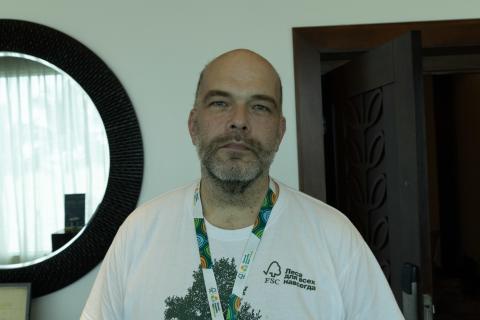Regional outlook: Disparity in Latin America
Home to the world’s first FSC-certified forest and FSC’s Secretariat Office, Latin America holds a special place in FSC’s history. Certification in the region has been reasonably successful in the private sector; however community operations have failed to reach the same level of growth. Let’s look at why this is.
FSC General Assembly 2011
Article contributed by Jose Luis Rengifo Balanta, FSC Columbia
Home to the world’s first FSC-certified forest and FSC’s Secretariat Office, Latin America holds a special place in FSC’s history. Certification in the region has been reasonably successful in the private sector; however community operations have failed to reach the same level of growth. Let’s look at why this is.
Operational differences
From an organisational standpoint, there are marked differences between community-based forest management and private management.
In many cases, community operations lack the basic levels of enterprise development to run a sustainable business, let alone to consider FSC a viable option. Mexico’s ejidos and community operations are an exception. Low organisational capacity, lack of capital, market access or the technical resources necessary to attain FSC certification, are all possible contributors.
Communities operate based on its cultural values and distinct concepts of quality of life and development, which in some case makes concepts like long-term planning, registration of documents, and market demands difficult to comprehend and practice.
Low organisational capacity has a significant impact across the other factors that inhibit participation in forestry certification, since learning advanced technical and operational skills requires a basic level of education and management tools that many members of community operations lack.
On the economic and investment front, community forestry operations face barriers to access the financial capital needed to make the rapid changes often needed at the organisational and technological level, in order to be in compliance against the FSC standard.
The result?
Despite the continued growth of the FSC system throughout Latin America, the majority of certificates are held by private enterprises working in plantation style forest management or under the concession system in countries like Bolivia.
Since the first certificate in 1993, 12.42 million hectares have been certified to FSC’s Principles for responsible forest management. Brazil holds the largest certified area in the region spanning some 6.3 million hectares, followed by Uruguay with 2.5 million hectares. Columbia has 96,000 hectares of certified area, comprised by four certificates held by private operations.
In terms of the supply chain, of the 837 certificates, once again Brazil leads with the largest portfolio of with 574, followed by Chile and Argentina with 76 and 50 respectively. In comparison, Columbia currently holds just 13 CoC certificates.
The Columbian case
In the land of cumbia music, the government plays a special tune for communities compares to other countries in Latin America. Areas of natural forest – occupying more than 40% of the country – are awarded by national legislation to the communities of African descent and indigenous heritage as an inalienable and indefeasible right.
So far three community enterprises have been supported extensively by the Colombian national initiative: Community Council Guapi High-CCAG, Cabildo Mayor de Chigorodó, and the Major Community Council Campesina Integral del Atrato-Cocomacia. Despite our efforts, none of these community operations have achieved certification yet.
A strategy of trust
Our task is to continue building trust with community operations so that these operations adopt and implement capacity building and organisational strengthening as a part of their practices and cultural values. We are also continuously monitoring and reinforcing enterprise development skills.
On a political level, our NI’s role has been moving towards promoting responsible consumption of wood at the local and national level. An example is the signing of an inter-sector legal timber pact in Colombia (August 2009); a joint effort of multiple public-private sector actors that demonstrates the commitment of the signatories, to cope with the traffic and consumption of illegal timber in the country.
We feel that it is also important to direct the efforts of all sectors into promoting the local timber market and educating consumers about topics such as responsible purchasing, emphasizing the importance of their contribution to the control and governance of the national forested area, promoting the management of community forestry operations, and monitoring logging operations and conservation of Colombia’s natural resources.
Jose Luis Rengifo Balanta
FSC Columbia



